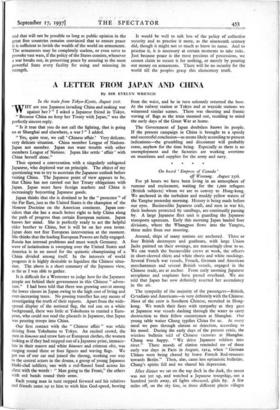A LETTER FROM JAPAN AND CHINA
By SIR EVELYN WRENCH
In the train from Tokyo-Kyoto, August 21st.
"WHY are you Japanese invading China and making war against her ? " I asked a Japanese friend in Tokyo. " Because China no keep her Treaty with Japan," was the perfectly sincere reply.
" Is it true that you do not call the fighting, that is going on at Shanghai and elsewhere, a war ? " I added.
" Yes, quite true, we call ' Chinese affair.' Very delicate, very delicate situation. China member League of Nations. Japan not member. Japan not want trouble with other members League of Nations. Japan like settle ' affair ' with China herself alone."
Thus opened a conversation with a singularly unbigoted Japanese, who deplored war on principle. The object of my questioning was to try to ascertain the Japanese outlook before visiting China. The Japanese point of view appears to be, that China has not carried out her Treaty obligations with Japan. Japan must have foreign markets and China is increasingly boycotting Japanese goods.
Japan thinks that she is destined to be the " protector " of the Far East, just as the United States is the champion of the Monroe Doctrine on the American continent. japan con- siders that she has a much better right to help China along the path of progress than certain European nations. Japan knows her mind. She is perfectly ready to act the helpful elder brother to China, but it will be on her own terms. Japan does not fear European intervention at the moment. She thinks that the leading European Powers are fully engaged. Russia has internal problems and must watch Germany. A wave of isolationism is sweeping over the United States and America is in no mood for the quixotic championing of a China divided among itself. In the interests of world progress it is highly desirable to liquidate the Chinese situa- tion. The above is a short summary of the Japanese view, as far as I was able to gather.
It is difficult for a Westerner to judge how far the Japanese people are behind their government in this Chinese " adven- ture." I had been told that there was growing unnst among the lower classes in Japan owing to the high cost of living and ever-increasing taxes. No passing traveller has any means of investigating the truth of their reports. Apart from the wide- spread display of the national flag, the red sun on a white background, there was little at Yokohama to remind a Euro- pean, who could not read the placards in Japanese, that Japan was pouring troops into China.
Our first contact with the " Chinese affair " was while driving from Yokohama to Tokyo. An excited crowd, the men in kimonos and straw hats or European clothes, the women looking as if they had stepped out of a Japanese print, immacu- late in their mauve and white kimonos and crimson obis, was surging round three or four figures and waving flags. We got out of our car and joined the throng, working our way to the central actors in the drama, a group of young Japanese khaki-clad soldiers, one with a red-flannel band across his chest with the words : " Man going to the Front," the others with red barids round their arms.
Each young man in turn stepped forward and his relatives and friends came up to him to wish him God-speed, bowing from the waist, and he in turn solemnly returned the bow. At the railway station at Tokyo and at wayside stations we witnessed similar scenes. There was shouting and frantic waving of flags as the train steamed out, recalling to mind the early days of the Great War at home.
The Government of Japan doubtless knows its people. If the present campaign in China is brought to a speedy and successful conclusion—as seems likely according to present indications—the grumbling and discontent will probably cease, anyhow for the time being. Especially as there is no unemployment and the factories are working overtime on munitions and supplies for the army and navy.










































 Previous page
Previous page